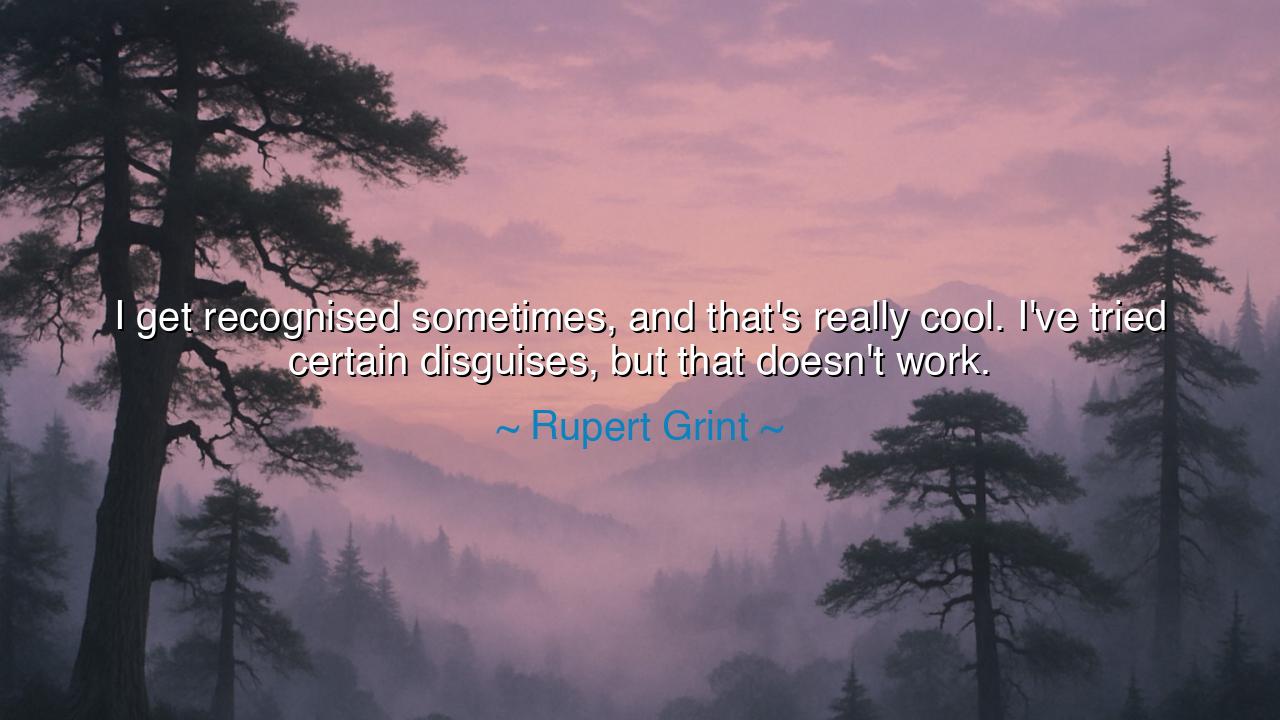
I get recognised sometimes, and that's really cool. I've tried
I get recognised sometimes, and that's really cool. I've tried certain disguises, but that doesn't work.






The actor Rupert Grint, known to the world as the beloved Ron Weasley, once spoke with humility and humor when he said: “I get recognised sometimes, and that's really cool. I've tried certain disguises, but that doesn't work.” Though the words seem lighthearted, they conceal a deeper truth — a reflection on identity, authenticity, and the human desire both to be seen and to hide. In this short and simple thought lies the eternal struggle of the soul: the balance between the joy of recognition and the burden of visibility.
For fame, like fire, gives both warmth and danger. To be recognised is to have one’s work and existence acknowledged — to feel the gaze of others who see you and say, “Yes, I know who you are.” Yet to be too exposed, too constantly watched, can also feel like losing one’s private self, that inner sanctuary where the heart breathes freely. Rupert Grint, who grew from childhood to adulthood beneath the world’s gaze, understands this paradox deeply. His words echo with both amusement and wisdom — the realization that no matter what masks we wear, the truth of who we are always shines through.
In the style of the ancients, we might say this: the face is but the vessel; the spirit is the flame within it. A man may attempt to hide his form, but not his essence. The philosopher Diogenes once roamed the streets of Athens carrying a lantern, seeking “an honest man.” He looked into the eyes of kings and beggars alike, for he knew that masks and disguises cannot conceal the soul’s light from those who truly see. Likewise, Grint’s admission that his disguises “don’t work” reminds us that authenticity has a power of its own — a brightness that cannot be dimmed even by effort. The essence of truth, once known to the world, cannot easily be hidden.
The origin of this wisdom lies in the tension between the self and the image — a struggle as old as civilization. In ancient theatre, the actors of Greece wore masks to represent gods and heroes, yet the spectators knew that behind each painted face was a mortal voice, trembling with human emotion. In the same way, every person in the modern world wears a kind of mask — the role of profession, family, reputation, or fame. But, as Grint learned, the mask eventually falls, and the real person — imperfect, vulnerable, luminous — stands revealed. The world may see you as a character, but time always reveals the human being beneath.
History gives us the tale of Marcus Aurelius, emperor and philosopher, who was seen by his people as a godlike ruler. Yet in his private writings, he stripped away all disguise, confessing his doubts, his weariness, and his longing for virtue. The world recognized him as an emperor; he recognized himself as a man. And therein lies the wisdom Rupert Grint expresses — that recognition from others, while flattering, is incomplete without recognition of one’s true self. For to live behind disguise is to divide the soul, and to live authentically is to be whole, even if the world sees you without your armor.
When Grint says, “That doesn’t work,” he speaks not only of literal disguises, but of the futility of hiding one’s nature. The truth of character will always reveal itself — through action, through voice, through the small gestures that no mask can conceal. Whether in the marketplace or in the halls of power, the eyes of others see what is real more than what is rehearsed. Thus, the wise learn to stop concealing and to begin accepting — to embrace visibility not as exposure, but as an opportunity for authenticity.
The lesson, then, is both simple and profound: do not fear being seen, and do not exhaust yourself trying to hide what is true. Whether you are known by millions or only a few, let your identity rest not on disguise, but on honesty. To be recognized is not a curse but a mirror — one that shows the world what your work, your actions, and your spirit have become. If others see you, let them see you as you are, for that is where dignity lives.
So, remember the words of Rupert Grint, spoken with the quiet understanding of one who has lived between shadow and spotlight: to be known is to be vulnerable, but to hide is to be lost. Let your life be a balance of visibility and peace — a dance between the outer recognition and the inner truth. For disguises may fade, but authenticity endures. And when the world calls your name, answer not with fear, but with gratitude — for it means that somewhere, somehow, your light has reached another soul.






AAdministratorAdministrator
Welcome, honored guests. Please leave a comment, we will respond soon